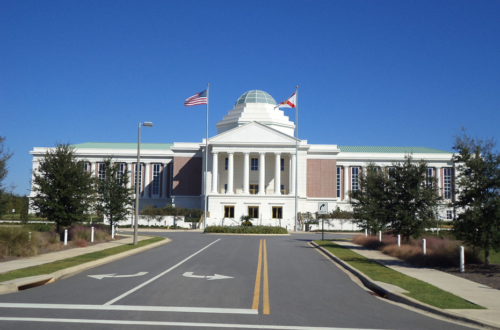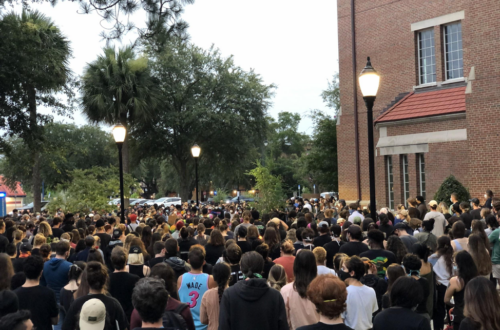Amidst a statewide teacher shortage of about 4,000 employees, Gov. Ron DeSantis, R-Fla., has set his sights on adding a boost to teacher salaries during the 2020 Florida Legislative Session. This is his attempt to incentivize prospective teachers to fill the job shortage while also giving pay raises to Florida’s most deserving teachers.
Kevin Purvis, Alachua County Public Schools’ assistant superintendent of human resources, is met with finding qualified teachers to fill the current 53 teaching vacancies. This is a daunting task, as teacher bonuses aren’t enough to persuade professionals to seek careers in public education.
The National Education Association (NEA) places Florida at #46 in the nation in teacher salaries at an average of $48,168 a year. Throughout the state, salaries vary as well. According to the Florida Department of Education, in the 2018-2019 school year, Monroe Country ranked #1 in teacher salaries with an average salary of $57,285. Alachua County finds itself near the lower end, ranking at #46 in the state with an average teacher salary of $48,486.
Teachers in the largest school districts in Florida, Miami-Dade County and Broward County, rank at #4 and #5 at an average teacher salary of $51,678 and $51,395. However, they say they cannot afford the cost of living in urban cities without a significant hike in teacher salaries.
Working with Florida Education Commissioner Richard Corcoran, R-Fla., DeSantis has made broad remarks about a massive $422 million plan to overhaul teacher salaries. DeSantis proposed a boost to the starting teacher salary in Florida– from $37,636 to $47,500, which would move Florida from #26 to #2 in starting teacher salaries in the nation. “My proposal to increase the minimum salary for teachers to $47,500 will help alleviate this shortage and elevate the teaching profession to the level of appreciation it deserves,” said the governor.
Recent efforts to boost teacher salaries have failed, such as Senate Bill 152, the Florida Teacher Fair Pay Act. This bill attempted to standardize a minimum salary of $50,000 for all teachers in Florida but failed in the Florida Senate Education Committee this May.
The fight for teacher salaries in Florida has been a long and arduous one. The last major pay increase across the state was back in 2013 under former Gov. Rick Scott, R-Fla., who approved a $480 million budget for teacher bonuses based on performance evaluations.
In 2015, the Florida Senate passed the Florida Best and Brightest Act, which gave teacher bonuses based on prior teacher credentials such as old ACT/SAT scores and making notable school improvements. The Florida Best and Brightest Act was readjusted in 2019 following a class-action lawsuit settlement of $15 million in favor of teachers and the Florida Education Association. This group argued that the SAT/ACT provision disqualified many teachers for the bonus and had a distinct impact on black, Hispanic, and older teachers.
But after a decades-long transition from salary increases to boosting bonuses, teachers have rallied for a focus on increasing overall teacher salaries over performance-based bonuses. Teacher unions throughout Florida argue that performance-based bonuses disproportionately affect teachers in poorer schools and schools with high levels of minority students who don’t experience the same results in standardized test performance and general education.
In 2018, Miami-Dade County, the largest school district in Florida, reached an agreement with the teacher union who fought for a salary increase of 5% at the beginning of this year and a 12.5% – 22.75% increase in July structured on base pay. This was the largest raise in the history of the county after a referendum in 2018 to increase property taxes to pay for teacher salaries passed with an overwhelming 71% of voters in favor.
In Broward County, a similar battle was met with less success last year. After much collective bargaining, the Broward Teachers Union settled for a less supportive 2.16% increase for 2/3 of its teachers and a 1.63% raise for 1/3 of its teachers. Teacher salary negotiations are set to begin again for the upcoming school year.
The next legislative session will come in January 2020. Governor DeSantis is expected to roll out his sweeping plan to improve statewide education, starting with statewide increases to teacher salaries in order to fulfill his legislative mission to fill the remaining teacher vacancies and encourage a shift away from performance-based bonuses.
Featured Image: Governor Ron DeSantis speaking at the 2018 Student Action Summit hosted by Turning Point USA (Unmodified photo by Gage Skidmore https://bit.ly/1jxQJM)






One Comment
Professor of Oldies
When will teachers realize that politicians will say anything to get elected, and once elected they will do nothing. Teachers salaries are an insult. But Democrats have the unions in the palm of there hand and they know by it